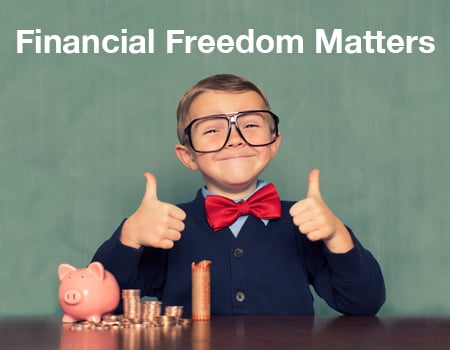Here in the Pacific Northwest, it is getting to be that time of year where it won’t be long before that flaky white stuff starts to fall. In my household, we always seem to announce the first snowflake we see. I prefer to watch it fall through the window, but my kids often let out a hoot then run to put on their shoes and head outside.
Something I’ve always marvelled at is how well snow sticks to itself when it's the perfect kind for building snowmen. It’s amazing how quickly a small ball, barely larger than your fist, is suddenly three feet tall and there’s green grass peeking through the snow again.
I recently paid off one of my loans (yay!). This caused me to reflect on how I could put the money I would normally use to make that bi-weekly loan payment toward another loan and effectively increase my payments on that second loan. I call this the snowball effect, and it’s essentially the reverse of how I got into debt in the first place.
You see, for me, once I had a big ball of debt, it didn’t matter as much psychologically if I went deeper into debt. Once I got over the initial feelings of shame and disappointment in myself for the first bill payment I missed and the first time I didn’t pay off a credit card in full at the end of the month, it became easy for me to keep missing payments and living on credit as long as I could. Until all the credit was maxed out, of course. Then I was in even bigger trouble than before.
The good news is, you can use the snowball effect to your advantage too. Once you pay off one loan, take the same payments and apply them to a different loan. Keep doing this until all your debt is paid off. In theory, if you don’t lose your job and you continue at the same wage (or maybe even get a raise), you will pay your debt off faster. But this only works if you don’t incur further debt.
Know How You Roll
The first step to making the snowball effect work for you is to stop going into debt. In my book Prosperity Planner I explain that debt is like a wound. If a wound is going to heal, you need to stop the bleeding. Using money you don’t have (aka credit) is like bleeding. If you don’t stop all the bad habits that got you into debt in the first place, you’ll never get out of debt.
It sounds simple, but it’s not.
Often when we end up in debt, we think we have good reasons for doing so. Sometimes we do. If you’re faced with an emergency and you don’t have any savings, what else can you do? The trick is looking at the situation objectively and determining if it is a true emergency.
You’ve likely heard the concept of needs vs. wants when it comes to personal financial management. We all have weaknesses and can probably convince ourselves we need to buy the latest book by our favourite author rather than borrowing it from the library.
At the end of the article, you’ll have a chance to use journal prompts to get clear on how you got into debt in the first place.
Check Yourself
If you’re like me, you might find it difficult to give up your bad habits. In the early stages of trying to reduce my debt, I noticed I’d make some good progress, but then I’d start to slip again. That’s when I started tracking my income and expenses more diligently. Doing this helped me monitor my spending more closely and make it easier for me to notice when I was starting to slip back into bad habits.
Reducing or paying off your debt requires work. If it were easy, there'd be no such thing as bankruptcy or credit counselling. Once you’ve determined how you got into debt and what habits you’re going to change to get out of debt, it's important to check up on yourself. Put it in your planner.
I record my income and expenses at a minimum of every two weeks, but it’s usually more frequent than that because this is an activity I’ve learned helps me feel in control of my spending habits. If you don’t like the idea of tracking your income and expenses every week or so, then at least put a monthly to-do item in your planner to check your bank and credit card statements to make sure things are as expected. You might be surprised by what you find.
Enjoy the Snowball Magic
Once you get your bad financial habits in check, you can enjoy the snowball effect when it comes to paying off your debt. Just keep rolling your payments into the next loan or credit card you want to pay off. Always check to make sure your loan was paid off when you were expecting your commitment to be complete. Mistakes happen, and it’s important to keep an eye on the paperwork.
Now that your loan is paid off, what will you do with the money that was being used to make the payments? For me, this was $200 bi-weekly. I’m going to funnel it toward a credit card I want to pay off. It’s the card that has the highest interest rate which means I can reduce the amount of money paid in interest if I pay it off sooner. It’s also the card with the lowest outstanding balance, so it will be a quick win for me in that it won’t take me long to pay it off.
The way you decide to pay off your debts is up to you. Many experts recommend paying off the loans with the highest interest rates first, so you can save more money. Quick wins have value too, though, so if you have any loans that are close to being paid off, you may want to consider paying those first.
Quick wins give us a boost in confidence and encourage us to keep going with debt repayment, a task that often takes many years.
Affirmations
Try using these affirmations for encouragement while using the snowball effect to your advantage.
- Reducing my debt is freeing.
- I’m making progress on paying off my debt.
- As I pay off one loan, I gain the opportunity to boost my progress on others.
Remember, the more you use affirmations, the better they work.
Journal Prompts
As with anything, journaling can really help you change your financial habits. Here are a few prompts to help you explore your own debt snowball as well as how to reverse it.
How did I get here?
This is a pretty broad question. More specifically, how did you get into debt in the first place? Here’s where you need to be objective and honest with yourself so you can start reversing your bad financial habits.
What will I do to improve my financial habits?
Once you know how you got into debt and the types of habits you should avoid, you can brainstorm what you’re going to do to get out of debt. How are you going to make sure you check-in with yourself and keep those bad habits from creeping back into your life?
How can I use the snowball effect to pay off my debt?
The snowball effect is how many people get into debt, but it can be a huge help at getting you out of debt as well. Make a list of all your debt and the order in which you want to pay it off. It’s okay if this changes as you start working on your plan. The main thing is that you have an accurate idea of how much debt you have and which loans you’re going to start attacking with extra payments once you start paying things off.
Sometimes debt is unavoidable, sometimes we think it’s necessary when really we could have done without the latest trendy jeans. Oftentimes, it’s the little purchases that add up and get us further into debt. The good news is, if you recognize how you got into debt in the first place, it will be a lot easier to make progress getting out of debt and continuing on your new path to better financial habits.
*****
From Mari:
Please comment below on how this Money Matters column has helped you.
Also, leave your suggestions for future topics you'd like to see discussed.
#JustWRITEON!

Author bio: Michelle Cornish is the author of Prosperity Planner: Manage Your Personal Finances and Get Out of Debt, an undated planner where she shares more about her personal financial journey and her TREE Method for keeping her personal finances in check.



Leave Comment